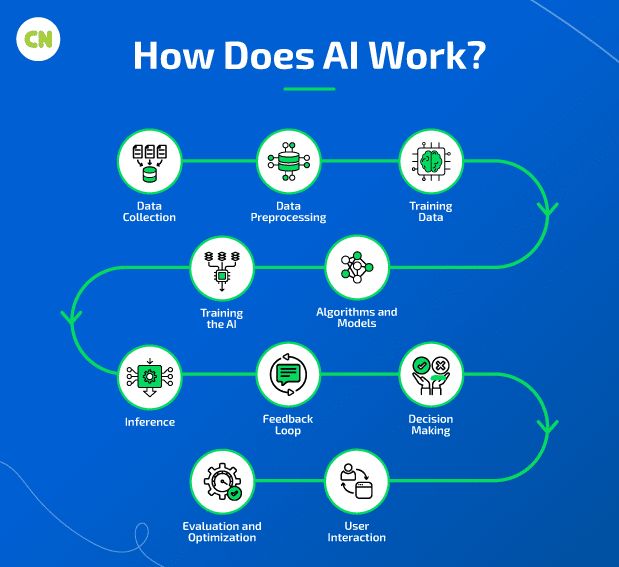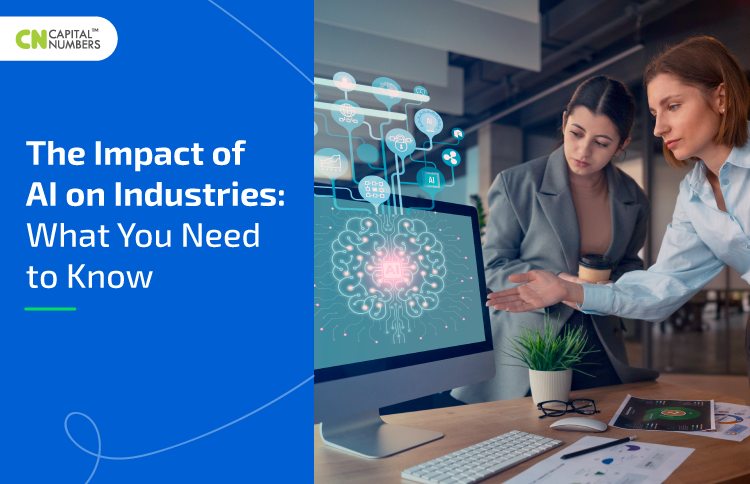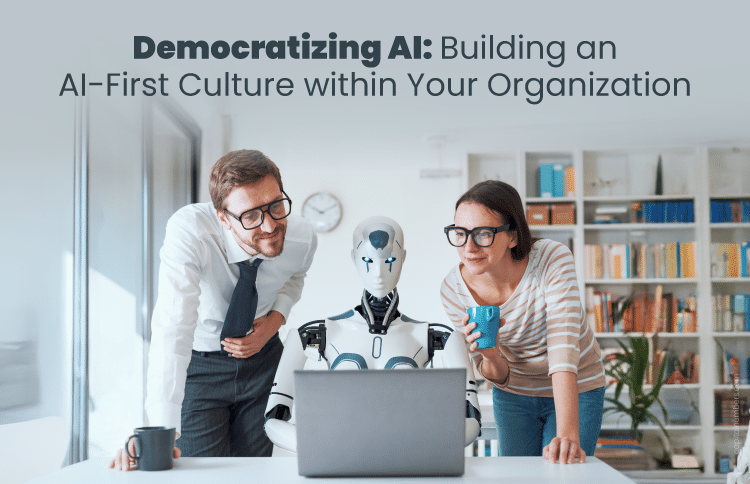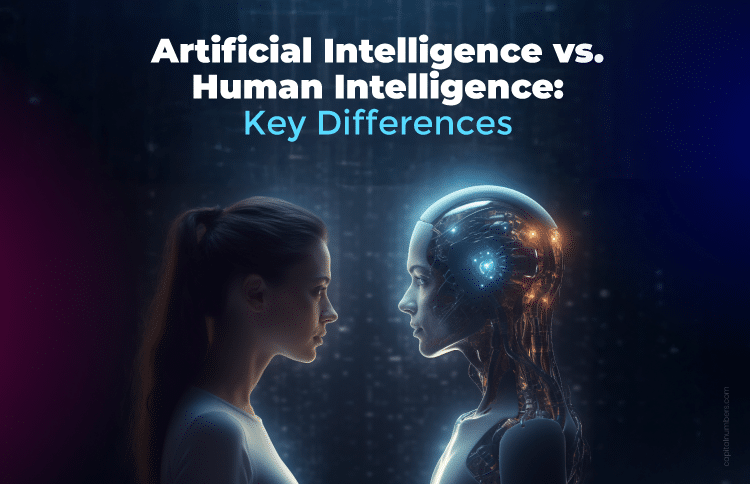The Impact of AI on Industries: What You Need to Know
Table of Contents
AI is a game-changer in today’s fast-paced world, offering unparalleled opportunities for companies to innovate, streamline operations, and gain a competitive edge. From personalized customer experiences to data-driven decision-making and enhanced automation, the transformative power of AI is leaving a lasting mark on every sector
In today’s dynamic business landscape, machine learning services have transitioned from a luxury to a strategic imperative. Now, adaptability and innovation serve as the true currencies of success. So, how exactly is AI reshaping industries and transforming the way we conduct business? Let’s explore.
How Does AI Work?
Artificial Intelligence (AI), including generative AI, simulates human intelligence processes using computer systems and algorithms. Here’s an overview of how AI works:
- Data Collection: AI systems begin by collecting and gathering large volumes of structured (e.g., databases) or unstructured (e.g., text, images, videos) data.
- Data Preprocessing: The collected data is organized and prepared for analysis. It involves data cleaning, normalization, and feature engineering to make the data suitable for AI algorithms.

- Training Data: For AI to learn, it needs a training dataset that generally includes labeled examples where the correct output is known. For instance, if you’re training a model to recognize dogs in images, the training data would consist of images labeled as “dog” or “not dog.”
- Algorithms and Models: AI uses various algorithms and models to process and analyze the data. Depending on the task complexity, these algorithms can be traditional machine learning algorithms or advanced deep learning neural networks.
- Training the AI: During the training phase, the AI system learns to recognize patterns and make predictions by adjusting its internal parameters. It involves repeatedly presenting the training data to the AI, comparing its predictions to the known correct answers, and adjusting its parameters to minimize errors.
- Inference: Once the AI model is trained, it can predict or decide on new, unseen data. This is called inference. For example, a trained AI model for image recognition can analyze new images and identify objects within them.
- Feedback Loop: AI systems often include a feedback loop, where they continuously learn from new data and user interactions. It allows them to improve their performance over time.
- Decision Making: Depending on its purpose, AI can perform various tasks like natural language processing, image recognition, decision-making, or automation It uses the knowledge gained from training to make decisions or provide recommendations.
- User Interaction: In many cases, AI interacts with users through interfaces like chatbots, voice assistants, or recommendation systems. These interfaces take user input, process it, and provide relevant responses or actions.
- Evaluation and Optimization: AI systems are regularly evaluated to ensure they perform accurately and effectively. They are retrained or fine-tuned using updated data to improve their performance if needed.
How Is AI Transforming Industries?
Since the launch of Open AI’s ChatGPT, AI has taken the enterprise world by storm. ChatGPT has caught the attention of business leaders and IT experts for its remarkable human-like abilities and exceptional accuracy.
Microsoft has invested $10 billion to develop generative AI technology to integrate into its Bing search engine. Google, the search engine giant, has launched Bard as its answer to Open AI’s ChatGPT. Meanwhile, Meta has partnered with Baidu to develop its chatbot after an earnings slump, resulting in an astonishing 201% surge in its share prices overnight.
With AI developments exploding across Big Tech, AI is expected to impact and transform most businesses over a few years. AI-enabled demand forecasting proves beneficial in supply chain management, while AI-powered content personalization enhances user engagement and conversion rates. AI’s impact extends to healthcare, finance, retail, marketing, and beyond. According to Grand View Research, the global AI market size is expected to grow 37.3% annually from 2023 to 2030. But how is AI shaping the future of businesses? Let’s find out.
1• Healthcare
- Diagnosis and Treatment: AI-powered systems can analyze medical records, images, X-rays, scans, and genetic data to assist doctors in making faster and more accurate diagnoses. Surgical robots and AI-assisted surgeries are becoming commonplace, reducing the risk and improving patient outcomes.
- Drug Discovery: AI accelerates drug discovery by analyzing vast datasets to identify potential compounds and predict their efficacy. It speeds up the process and lowers research and development costs.
- Personalized Medicine: AI tailors treatment plans to individual patients by considering their genetic makeup and medical history, leading to more effective and targeted care.
2• Software Development
- Code Generation and Autocompletion: AI-powered tools can assist developers in writing code more efficiently. They analyze existing codebases to provide autocompletion suggestions, reducing coding errors, speeding up the task, and thus transforming the software development process.
- Automated Testing: AI-driven testing tools can simulate user interactions, detect bugs, and identify vulnerabilities more comprehensively than manual testing. It results in higher-quality software and faster testing cycles.
- Bug Prediction and Prevention: AI can analyze historical data to predict potential bugs and issues in code. By identifying problem areas early in the development process, developers can proactively address them, reducing debugging time.
- Code Refactoring: AI can suggest code refactoring improvements to enhance code readability, maintainability, and performance. It helps developers adhere to best practices and improve the overall quality of their code.
3• Finance
- Algorithmic Trading: AI algorithms analyze market trends and execute trades quickly, making financial markets more efficient.
- Risk Assessment: AI assesses credit risks, fraud detection, and cybersecurity, helping financial institutions make informed decisions and protect customer assets.
- Customer Service: Chatbots and virtual assistants provide instant customer support and personalized financial advice.
4• Marketing
- Customer Insights: AI analyzes customer data to provide insights into preferences and behaviors, enabling highly targeted marketing campaigns.
- Content Personalization: AI recommends products, services, and content based on user behavior, increasing engagement and conversion rates.
- Ad Campaign Optimization: AI optimizes advertising campaigns by adjusting real-time parameters for better ROI.
5• Retail
- Inventory Management: AI helps retailers optimize inventory levels, reducing overstock and understock situations.
- Recommendation Engines: Personalized product recommendations increase sales and customer satisfaction.
- Checkout-Free Stores: AI-powered systems enable cashier-less shopping experiences, streamlining the shopping process.
6• Manufacturing
- Predictive Maintenance: AI analyzes sensor data from machinery to predict when maintenance is needed, reducing downtime and increasing productivity.
- Quality Control: Computer vision systems powered by AI can detect defects in real time, ensuring that only high-quality products reach customers.
- Supply Chain Optimization: AI optimizes supply chain operations by forecasting demand, managing inventory, optimizing logistics, reducing costs, and improving delivery times.
7• Transportation
- Autonomous Vehicles: Self-driving cars and trucks are being developed with AI technology, potentially reducing accidents and improving transportation efficiency.
- Route Optimization: AI optimizes routes for delivery and logistics, saving time and fuel costs.
- Traffic Management: AI helps manage traffic flow and reduce congestion in smart cities.
Opportunities of AI
The opportunities of Artificial Intelligence are significant and growing rapidly. It enables organizations to automate repetitive manual tasks, get insights from data, and develop new value propositions. And thus, it accelerates digital transformation across all industries. The key opportunities of AI include:
- Better Automation: AI-enabled machines can learn and adapt to new tasks. So, they are more efficient and productive than traditional machines. For instance, robots with AI capabilities can effortlessly perform complex manufacturing, logistics, and quality control tasks. It improves the quality of products and services, reduces the risk of errors, and improves overall efficiency.
- Personalization: AI can analyze vast amounts of data to understand customers’ preferences and behavior patterns. It helps businesses offer personalized products and services, improving customer satisfaction and loyalty. For instance, online retailers can use AI algorithms to recommend products depending on customers’ purchases and browsing histories. It helps customers find products they are interested in and encourages them to make more purchases.
- Insights from data: AI can process vast amounts of data to uncover valuable insights. Businesses can use this capability for data-driven decision-making. For instance, in finance, AI algorithms analyze market trends and historical data to make investment recommendations.
- Competitive advantage: Businesses that adopt AI early gain a competitive edge. AI can help companies identify emerging trends, customer preferences, and market opportunities more quickly and accurately than their competitors. This strategic advantage can lead to increased market share and profitability.
- Cybersecurity: AI enhances cybersecurity by identifying and mitigating threats in real-time. Machine learning algorithms can detect unusual patterns and behaviors in network traffic, helping organizations defend against cyberattacks.
- Innovation: AI fuels innovation by enabling the development of new products and services. In the automotive industry, AI is driving advancements in autonomous vehicles, changing the future of transportation.
The Near Future of AI
The future of AI holds great promise, offering improved access to information, education, healthcare, and transportation. It will also require more technical expertise and generate solution-oriented individuals. However, it raises ethical concerns regarding bias, discrimination, privacy, and accountability for errors.
In the near term, better-developed generative AI, such as DALLE2, will emerge, and AI will become more widespread in various industries. Healthcare, in particular, is expected to benefit. The growing use of AI will likely lead to increased regulations and efforts to address ethical issues, such as bias and transparency in data processing.
Also Read : The Future of Digital Transformation: 10 Predictions for 2024
Bottom Line
AI is not just a technological trend but a fundamental shift in business operations. It empowers organizations to automate tasks, improve customer experiences, make data-driven decisions, and revolutionize industries.
As AI advances, its impact on businesses across every sector will escalate. Preparing for this future needs a strategic, collaborative approach emphasizing upskilling employees, endorsing diversity, and ensuring ethical implementation of AI. In this era of technological progress, companies using AI’s potential will thrive and lead the future of work.
If you want to prepare your business for the future and improve your company’s performance and growth with expert developers, opt for Capital Numbers. We’re an award-winning software development agency offering innovative, agile, and tailored services as per business needs. Want to discuss your project? Call us today!














